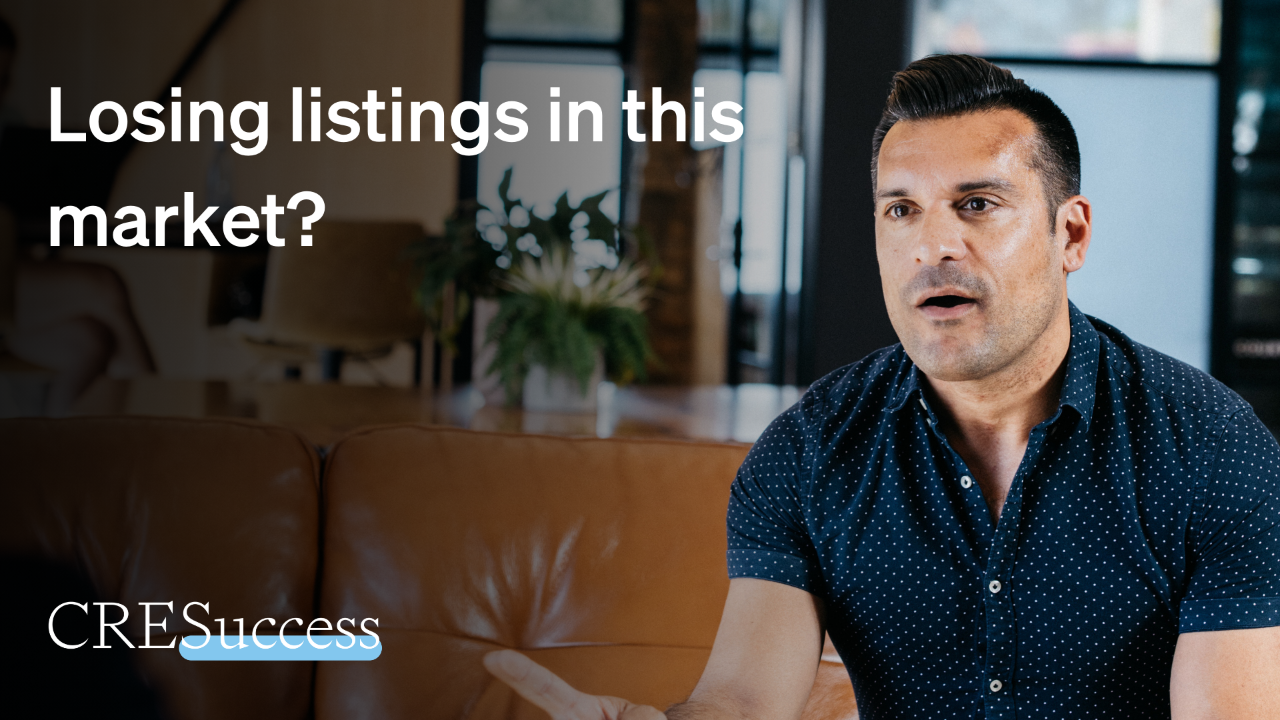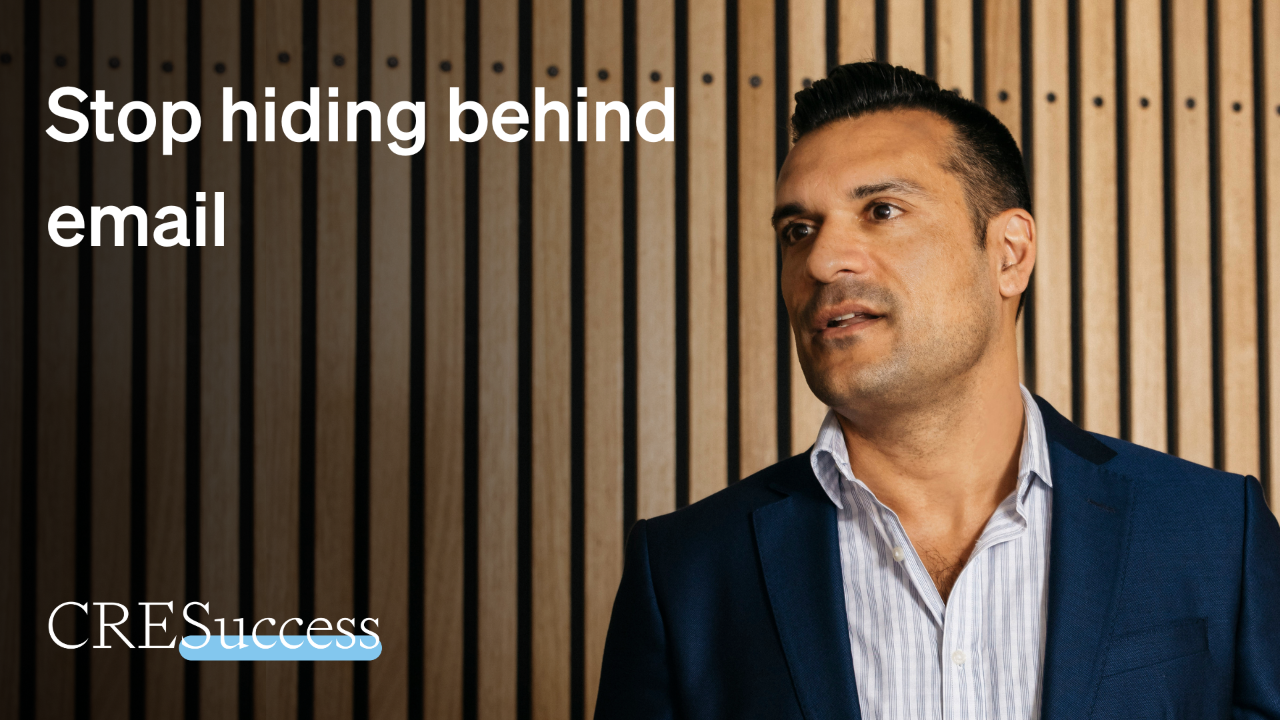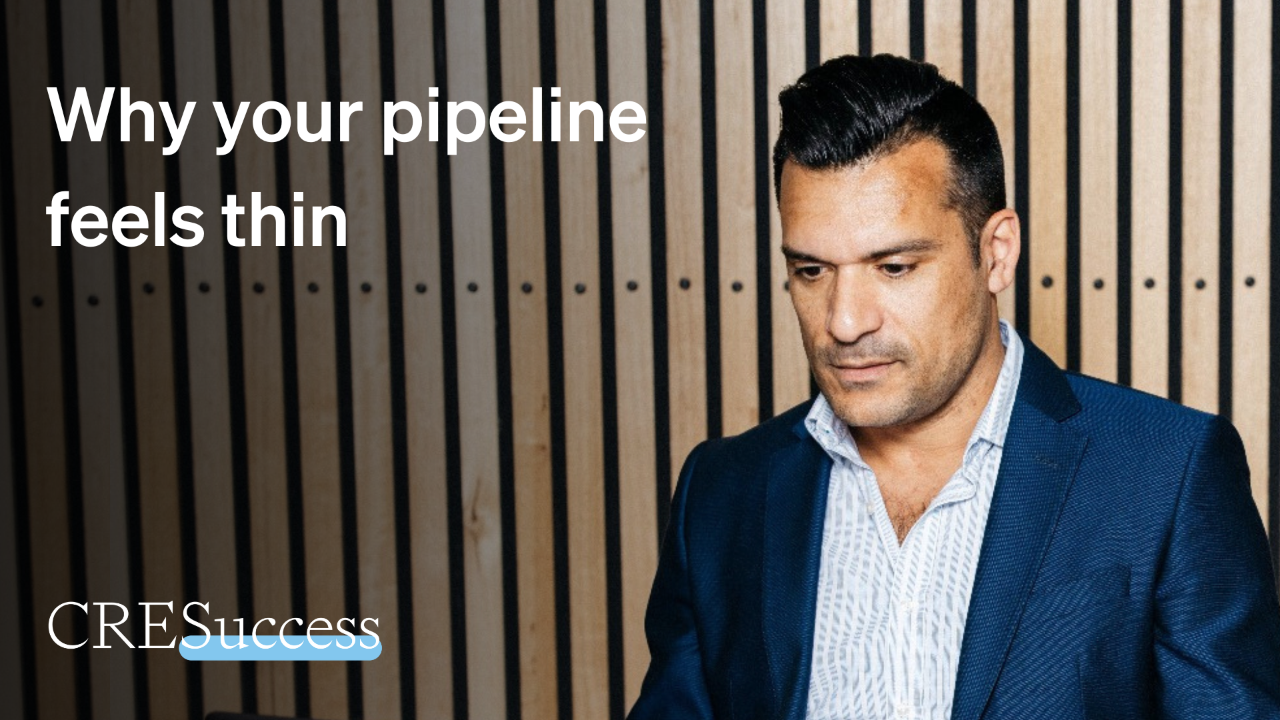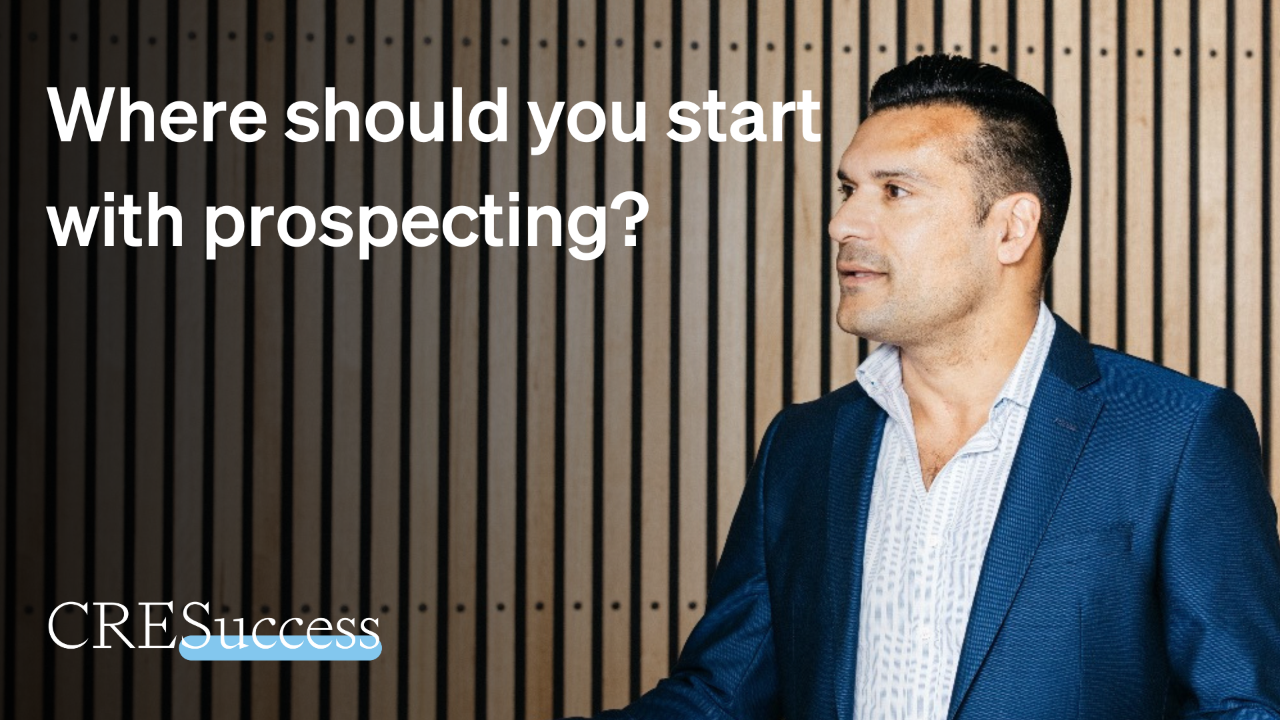Residential real estate agents should think twice before entering the commercial market.
Sep 03, 2025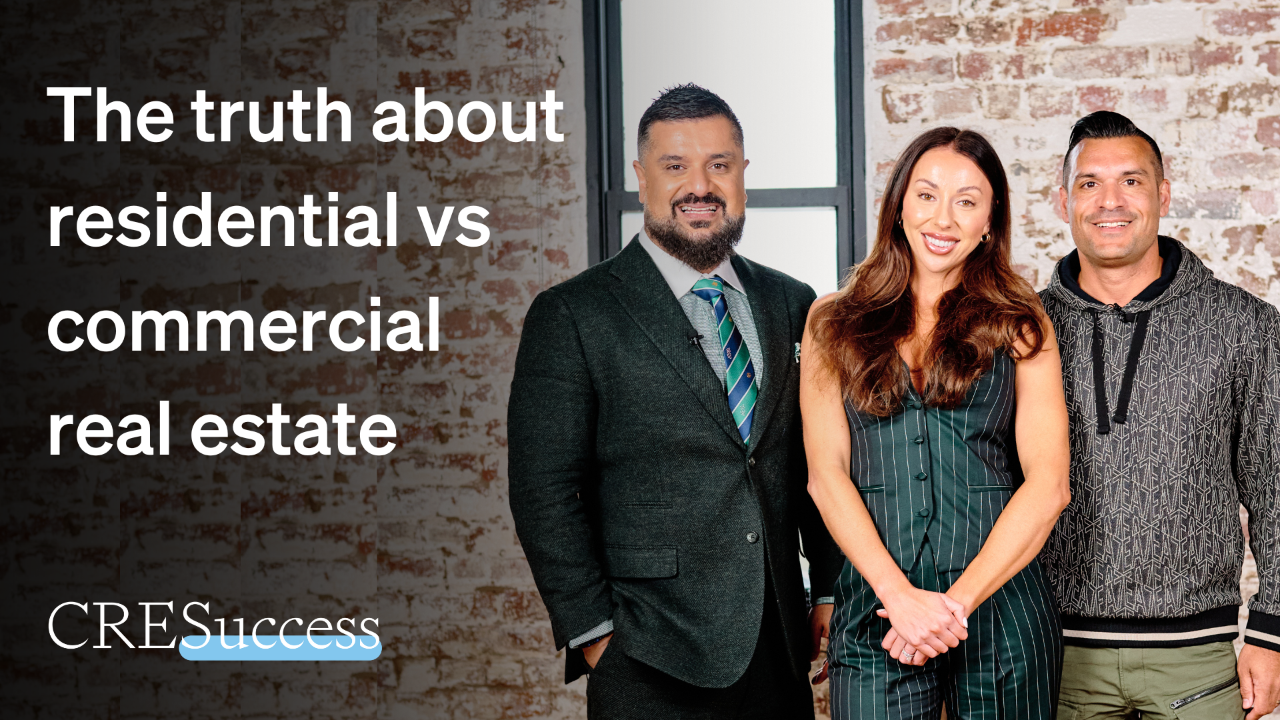
CRE Success Principle: Long-term growth comes from leaning into what you do best – whether it's retail leasing, investment sales, tenant representation or something else – not chasing shiny objects outside your lane.
When I was invited to join Rex Afrasiabi and Chanell McAsey on their Real Estate Renovators podcast, we covered a topic that I know many agents wonder about: what really separates residential from commercial real estate?
The truth is, there are similarities and differences in the skills required, commercial property is driven by a different set of dynamics. Residential transactions are often driven by emotional considerations, while commercial transactions are more often analytical, with investors looking at yields, comparable analysis, and future use of the asset.
That means commercial agents need to be across market trends, financial performance, and regulatory frameworks in a way that many residential agents rarely encounter.
I also cautioned against “resi-mercial” as a strategy. In major markets, trying to do both can dilute your effectiveness. Instead, if you’re a residential agent receiving commercial leads, the smarter move is usually to partner with a commercial agency. A strong referral arrangement lets you benefit without risking compliance or credibility.
We also discussed current trends shaping commercial real estate: the rise of mum-and-dad investors in the sub-$2m category, the growth of buyers’ agents, and the resilience of retail in certain locations.
Commercial real estate is a sophisticated sector that rewards specialisation. If you want to hear more about the skills, trends, and strategies that separate commercial from residential, tune in to episode 236 of Commercial Real Estate Leadership.
Episode transcript:
So, I've got something a little bit different for you in today's episode. I don't do many other people's podcasts as a guest anymore. It's just not very high up on my current list of priorities, even though I do see the benefit.
But when I was invited by Rex Afrasiabi and also Chanell McAsey to come on their podcast, Real Estate Renovators, I was very happy to do it.
I've seen Rex speak at an event and, as a result of the quality of what he did at that event, I invited him to come and speak to my private clients, which he did. Then he invited me to come on the podcast Real Estate Renovators with him and Chanell, and I'm already familiar with Chanell’s work through the market.
They're both high-profile entrepreneurs serving the real estate industry, both based in Melbourne, and I'm really excited to share my interview with them in today's episode.
Hello and welcome to episode 236 of Commercial Real Estate Leadership. My name is Darren Krakowiak. I help commercial real estate principals to lead their people to better performance, to grow revenue in their business faster, and to have less stress in their lives.
As I mentioned at the top of the show, today's episode is a portion of an interview that was conducted on Real Estate Renovators with Rex and Chanell.
In this first part of the interview, you're going to hear me talk a bit about my background and then the guests ask me a bunch of questions about the commercial market.
While this wasn't quite triggering for me, it did remind me of when I was working in commercial real estate, and particularly when I was running a commercial real estate business, and I almost had to tap dance while talking about all the different markets.
I was at a lunch recently, which I kind of reference in this episode, but I don't reference this part of the lunch.
The part of the lunch that I remember most was that one of my clients, who's running his own firm, was doing the same tap dancing that I used to do—commenting on the industrial market, the retail market, the office market.
In this episode you'll notice that I'm maybe a little bit rusty when it comes to talking about the markets, and I even lose my train of thought at one point. But hopefully, my recovery is OK, and I'm happy to share all of the raw footage with you.
So, I hope you enjoy this portion of the interview, and thank you to Rex and Chanell for inviting me on the Real Estate Renovators.
Interview
Rex:
Darren, welcome to the show.
Darren:
Hey Rex. Hey Chanell.
Chanell:
Hello! Thank you so much for coming on today.
Darren:
Thank you so much for having me. I feel like I've been waiting for this moment to be on Real Estate Renovators.
Chanell:
For those, hopefully very few, that don't know you—tell us about you.
Darren:
Well, I'm Darren Krakowiak. I'm the founder of CRE Success. We exist to help commercial real estate principals to really be the best leaders that they can be, to grow their businesses faster, and to have less stress in their lives.
Most of my clients are commercial real estate principals. They're the owners of independent boutique and franchised commercial real estate businesses around Australia.
I also have a digital product and a membership for commercial real estate agents, where we teach them the core skills of things like prospecting, personal branding, time management, and turning listings into sales. That's there for any agents. We've got members from about eight countries around the world.
Rex:
Wow. There's a lot to take in with that. Let's unpack it. Let's go back to your story because you didn't always live in Australia. You've had some high leadership roles. You've managed over 300 people. How did you start? What's your career path been like?
Darren:
I just sort of fell into real estate. I did a Bachelor of Economics and a Bachelor of Commerce at university. My first job out of uni was with a group called Jebb Holland Dimasi, which is now part of Urbis, which is planning and valuations. They do a bit of tenant representation, and I was in the economics and property part of it.
Basically, we worked for clients who were shopping center owners and retailers, and we would analyze: if you refurbish or expand your center, or if you open a new shop, how much turnover you're going to get based on the market share analysis. That was how I fell into real estate.
After that, I worked for a couple of other firms and then landed at JLL. After a couple of years at JLL, I got the opportunity to go to South Korea. That was really something I wanted; it was the reason why I wanted to work at JLL—because of the global opportunities.
I ended up staying there for 11 years.
Rex:
Wow. What was the transition like to go from Melbourne to South Korea?
Darren:
I was 27 at the time, so it was pretty recent. It was pre-global financial crisis, right? Back then, there were still things like expat packages. They took pretty good care of you.
I was young and I just thought it was great. I went over there for a bit of a recon visit—they flew me over for just a week of partying, basically. They were like, “Hey, come and live in Korea. It's awesome here.” I was like, “Yeah, it is pretty awesome.”
The transition was pretty easy. I fell into some good friends in the expat community there. The job was pretty easy, too.
When the global financial crisis happened, that changed things, and my role changed. But that was actually the turning point when my career really started to take off. I was given additional responsibility. I transitioned from research and consulting into tenant representation first, then office leasing—so becoming more of an agent. That shift led to other opportunities, including country management.
Chanell:
Drawing it back, Darren, I know we obviously are acutely aware, but for our wider audience, what are the key differences between commercial and residential real estate?
Darren:
So, when we talk about commercial, we're typically talking about three main sectors, which is office, industrial, and retail. There are some newer emerging sectors like the care sector, self-storage, data centers.
Some people might put development sites in commercial, but typically, it's everything except residential. And I think the difference is that it's a little bit more sophisticated.
It’s probably a lot of the same principles that apply in residential also apply in commercial, but it's less of an emotional investment, except if you're an owner-occupier, I guess.
So probably owner-occupiers are thinking more like a person who's purchasing their own home, but most people that are purchasing commercial property are investors.
And that just means that it requires, I think, some different skill sets perhaps, it's probably more like if you're selling to an investor, as a residential real estate agent, more of your clients are like that, they're looking at things like the yield.
They're looking at things like comparable sales results. They're looking at things like the future use of the asset and, you know, whether it's got the highest and best use.
They're looking at more things than just, a lot more analytical based on the numbers.
Chanell:
So, in terms of skill set, what sort of skills would you need as opposed to a residential agent? What are the defining skills? Do you need a university degree?
Darren:
No. There are plenty of people—I’ve got clients and plenty of people—who have been super successful, risen to the top of commercial real estate firms, and haven’t had any formal education. I think nowadays, you’d probably be a little bit harder pressed to get a job in one of the bigger firms if you don’t have a degree, but it hasn’t been a prerequisite before.
The only prerequisite is the same thing that exists in the residential sector, which is to have your relevant estate license, whether as a representative or as the actual agent principal. I can't think of it. Was it the license agent rep certificate?
Rex:
Off seniority control.
Darren:
Thank you. Yes. So that would be what you require, and that’s all you need, basically.
Chanell:
Yeah, just leading on to this—so with residential, what you really need to understand is obviously your local marketplace, the demographic of people, the types of properties that are prominent in the particular area in which you’re listing and selling. What do you really need to know in commercial?
Darren:
Look, I think it’s probably not so much about a patch. Most residential agents are covering a patch, and they might be working within a certain value range. In commercial real estate, it can be a little bit broader. I think it’s still better to specialize, but you might, for example, specialize in Asian investors, or you might specialize in values between $1 and $5 million but do a little bit in office and a little bit in industrial.
I think it’s still traditionally more likely that you’d be focusing on one of the asset classes and probably focusing on sales or leasing, although industrial tends to be both sales and leasing. So, I think it’s just a different type of specialization, and it’s not always just based on geography, which is more what people in residential real estate tend to focus on. The drive for an inspection might also be a little bit longer if you’re a commercial real estate agent a lot of the time.
Rex:
Can I just—and I’ll make this the last question about residential, then we’ll move on to your coaching and everything else that you do—but there’s so much, like, when it comes to commercial agents, there’s not as many as residential agents. In every suburb you go, there’s a patch and there’s like five-plus residential agents, and they’re, in my opinion, missing out on a big opportunity for themselves. Because if they add commercial to their portfolio of things they do, there’s a wealth of opportunity for them that they don’t do.
And from a coach full of commercial agencies, how would a residential agent convert to adding that commercial agency into their agency?
Darren:
Yeah, I would caution residential real estate agents from dabbling in commercial real estate because it just requires a whole lot of different regulations and legislation that you might need to be aware of. If you’re a residential real estate agent and you’re getting some good leads in commercial, my recommendation would be to find a good commercial agency that you can refer to, that you can get into a referral arrangement with. Collect your 20% or whatever agreement you come up with, and just focus on your knitting in residential.
Rex:
Not try to add it or learn it?
Darren:
Well, I think you could choose to transition into commercial, but unless you’re in a small regional area—where I think it makes sense to do both because there’s only so much work to do—if you’re in a major capital city market, “resi-merical” doesn’t really work. It’s far better to specialize.
The other thing I’d say in terms of differences is, whatever’s happening in residential right now is probably a trend that we can expect to see in commercial maybe in two or three years’ time. So, commercial’s a little bit more traditional, a little bit more staid. If you look at things like social media trends, they’re faster-moving and more quickly adopted in the residential real estate space than they are in the commercial space.
Chanell:
Interesting. In the commercial space right now, what do we need to be aware of? Obviously, we’re watching the news, we’re seeing that commercial’s taking a pretty big hit. I think we thought it would slow down post-COVID, particularly in office spaces, CBD leases. What do we need to be aware of in the commercial market right now?
Darren:
A lot of things—that could be a whole topic of discussion in and of itself. Interest rate movements are important. We’re now in an expansionary cycle where interest rates are falling. That’s likely to bring more confidence. Unfortunately, they didn’t fall last month, but by the time of release, they may have. Interest rate movements are important.
There are more mum-and-dad investors buying commercial real estate than there have been in the past. When you look at the proliferation of commercial buyers’ agents that are opening up opportunities to people purchasing in the sub-$2 million category, that’s giving investors—particularly residential investors who maybe have a couple of residential properties—the confidence to diversify a little bit and move into commercial. And I think that trend is likely to continue.
If you look to the United States, which is probably a little more advanced in some trends, one of the things that happens there is there’s generally representation on both sides of the transaction for both leasing and sales. Often, particularly in leasing transactions, the tenant rep—the one representing the tenant—is compensated a lot more than the person representing the landlord. Whereas in Australia, typically it’s landlord representation, and the tenants or the buyers are generally doing their own thing, although buyers’ agents are a growing and emerging segment.
Rex:
Not so much in commercial yet, but it should be a big, growing sector because it’s a lot more involved in commercial.
Darren:
Most commercial buyers, up until recently, have been experienced buyers. They’ve had the capability because they’ve bought and sold, or their families have, or they’re institutional buyers with in-house capability. But now that there’s more interest from mum-and-dad investors in purchasing commercial property, there’s more of a need for these buyers’ agents.
Chanell:
Is that because of land taxes and all the rest—people selling off their residential assets and looking to invest in commercial?
Rex:
Land tax is still on commercial as well.
Darren:
It could be, for example, I own some residential property in Victoria, and I’m probably looking now to buy a commercial property. But I probably wouldn’t want to buy one in Victoria because I’m already at a pretty high threshold on land tax. That might influence where I decide to buy, or maybe I’d put it in a different vehicle so I’m not attracting the same land tax through my personal name through another vehicle.
I think it’s more about—sorry, I lost the question.
Chanell:
No, it’s all right.
Darren:
Is it about land tax and why they’re moving from residential to commercial as an investment opportunity?
Rex:
We can move on if you prefer.
Darren:
I had it and I lost it.
Chanell:
It happens to me all the time. What about the retail space? That’s taking a bit of a hit. What’s happening in retail?
Darren:
I’m not an expert in the day-to-day of retail—my clients are. I’ve got a few clients that trade, buy and sell, and also lease real estate on behalf of their clients in retail.
What I’d say is that probably in the CBD, we’re starting to turn the corner a bit. Some of that convenience retail that focuses on the office worker is still a little depressed. There are probably, in my opinion, too many coffee shops.
But if you look at the foot traffic in the CBD on the weekends, it’s actually up a lot since post-COVID. That means there’s more destination-type retail in the CBDs. At the same time, more people working from home means there’s probably more of a need for retail in the suburbs.
There’s also a trend toward service or experiential-type retail, as opposed to just walking into a shop to purchase apparel or homewares. The type of retail is changing.
I think retail is still a good asset class. There are some disadvantages from a land tax perspective, because it’s more difficult to pass on the land tax costs to a retail tenant because of the Retail Tenancy Act—and Rex can tell you all about that.
That’s one reason I probably wouldn’t prefer retail, given some of the uncertainty around what governments look to do with land tax.
Rex:
And compliance—there’s a lot more compliance for retail than for industrial or commercial.
Darren:
Yeah. I think commercial is the one that used to be the ugly duckling, which now most people like because there’s a lot of demand for it. It’s pretty easy to manage, and the tenant takes care of most things.
Chanell:
But you walk down somewhere like Chapel Street, which used to be a bustling shopping district, and now you just see “for lease, for lease, for lease,” …
Darren:
And someone chasing you with a machete.
Chanell:
That’s true—it’s become quite the area. But why is that? I mean, why would you have a commercial shop front and then not want to lease it out? I’m hearing it’s because the prices are too high. Is that correct?
Darren:
I was at a lunch recently with a number of private owners of commercial real estate, and we were talking about Chapel Street. There are a lot of owners there who are quite happy to hold out because they want to preserve the price. At the moment, there aren’t people willing to lease at that price, so they’re not meeting the market.
Something is going to have to change—whether it’s a change of use, a change in planning laws, or those landlords deciding at some point, because one of the reasons real estates transacts is death or divorce. Maybe something in the family circumstances will change, which will then cause the selling of that real estate, and then maybe the new investor will be more amenable to meeting the market.
Host:
So, they prefer to stay untenanted?
Darren:
Some do, yeah.
Chanell:
You can see how fast it can affect the vibrancy of an area.


